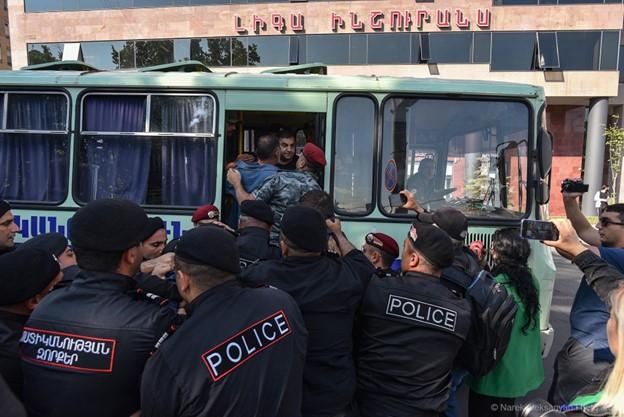
Increasing security concerns related to the return of territories under the control of Armenia for the last 30 years to Azerbaijan and the pertinent protests in local communities, led to a movement “Tavush for Homeland” (launched by Archbishop Bagrat of the Tavush Diocese). The Archbishop initiated a march to Yerevan, replicating the methods of the 2018 Velvet Revolution in Armenia, to mobilise people for civil disobedience and demand the resignation of the Prime Minister Nikol Pashinyan. Though largely peaceful, the demonstrations were at times met with disproportionate and brutal reactions by the police, who detained hundreds and heavily beat some organisers, as well as peaceful protesters. In particular, violent actions were observed during the protests on May 27, 2024, with a total of 285 persons detained and later released.
Protests in the Tavush region around border delimitation issues
On April 19, 2024, the Armenian government announced plans to return some territories in the borderline of the Tavush region, which had been under the control of Armenia for about 30 years, back to Azerbaijan as part of a border delimitation and demarcation process. This announcement sparked public debate over the rationale of this decision and mass demonstrations in the Tavush region, concentrated in the border village Kirants. Local residents, concerned about the security of their community, were joined by groups from other locations, including oppositional political parties, to prevent the handover. However, the police cracked down on the protests and the delimitation process has been technically completed.
Anti-government actions in Yerevan accompanied by mass detentions and use of force
In the following weeks, the protests led by Archbishop of Tavush Bagrat Galstanyan moved to Yerevan, demanding resignation of the Prime Minister Nikol Pashinyan. Since May 13, the members and supporters of the movement, including the members of Parliament opposition, have been blocking and paralysing the traffic in several central streets of Yerevan. The protests were accompanied by mass detentions, with particularly high number of detentions and violent treatment observed on May 27 while the police were trying to unblock the streets. According to official information, 285 persons were detained and later released by the police. Some of the protest participants, including a member of the National Assembly, faced physical and verbal violence by police officers.
Human Rights Defender and CSOs criticised police actions
The office of the Human Rights Defender (HRD) of Armenia stated that a number of unlawful actions have been identified as a result of monitoring by the HRD team. In particular, there are records of use of force against a person after they have already been under the control of police officers. Further, the HRD’s office identified cases of unlawful detention without clear grounds for detention, and failure to inform people about their rights. In some cases, even though the actions within the framework of the administrative proceedings have been completed, people continued to be unnecessarily detained in the police station until the 3 hours defined by the law expired.
Several CSOs have issued a statement condemning the police violence and demanding the police acts within the legal framework and with respect for human rights. Further, CSOs have demanded that the Prosecutor General's Office and the Investigative Committee conduct an independent and effective investigation of each case of human rights violations and hold the police officers who committed these violations accountable.
According to the police, a number of internal investigations have been launched after the recent events, and one police officer was dismissed for the incident related to the member of Parliament. As highlighted in the CSO Meter country report, such investigations have in the past usually resulted in disciplinary sanctions only, with no criminal sanctions applied. The above-mentioned statement of CSOs reiterated the recommendations continuously raised in the CSO Meter reports, urging the Ministry of Internal Affairs to respect the rights of peaceful protesters, refrain from violence, disproportionate use of force, and other actions that degrade their dignity, and ensure the conduct of any peaceful assembly, as well as immediately remove those police officers who do not meet these standards.
Photo credit: Narek Aleksanyan, hetq.am, https://hetq.am/en/article/166896
